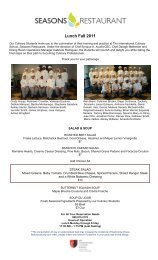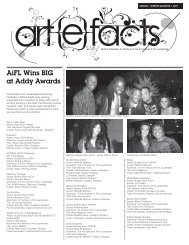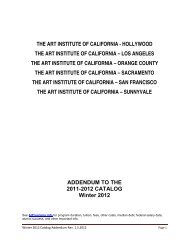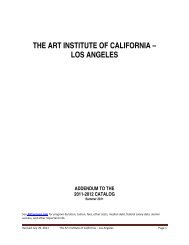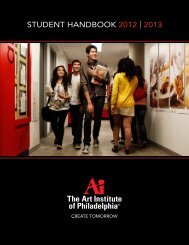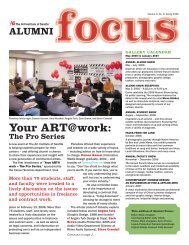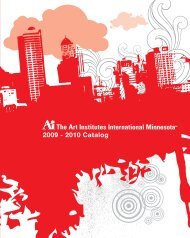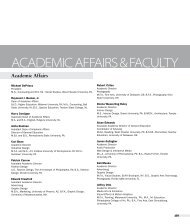2011-2013 CATALOG - The Art Institutes
2011-2013 CATALOG - The Art Institutes
2011-2013 CATALOG - The Art Institutes
Create successful ePaper yourself
Turn your PDF publications into a flip-book with our unique Google optimized e-Paper software.
70<br />
2. Paraphrase: Prompt acknowledgment is required<br />
when material from another source is paraphrased<br />
or summarized in whole or in part in your own<br />
words. To acknowledge a paraphrase properly,<br />
one might state: “to paraphrase Smarte’s<br />
comment…” and conclude with a footnote<br />
identifying the exact reference. A footnote<br />
acknowledging only a directly quoted statement<br />
DOES NOT suffice to notify the reader of any<br />
preceding or succeeding paraphrased material.<br />
3. Borrowed Facts or Information: Information<br />
obtained in one’s reading or research, which is<br />
not common knowledge among students in the<br />
course, must be acknowledged. Examples of<br />
common knowledge might include the names<br />
of leaders of prominent nations, basic scientific<br />
facts, general knowledge, etc.<br />
Materials which contribute to one’s general<br />
understanding of the subject may be acknowledged in<br />
a bibliography and need not be immediately footnoted.<br />
One footnote is usually sufficient to acknowledge<br />
indebtedness when a number of connected sentences<br />
in the paper draw their special information from one<br />
source. When direct quotations are used, however,<br />
quotation marks must be inserted and prompt<br />
acknowledgement is required.<br />
Faculty Policy on Academic Dishonesty<br />
Evaluation of student performance is the exclusive<br />
province of the faculty. <strong>The</strong> faculty will make reasonable<br />
efforts to verify that work is done by the student who<br />
is to receive credit for its completion. Examinations<br />
should be proctored or monitored to prevent<br />
students from copying or exchanging information.<br />
Examinations and answers to examination questions<br />
should be secured in a way that students cannot have<br />
prior access to them: the authenticity of quotations<br />
and references cited by students should be reviewed<br />
by faculty to ensure that proper credit is given for<br />
ideas and information taken from other sources, etc.<br />
If, in the faculty member’s sole judgment, there is<br />
evidence of academic dishonesty on the part of a<br />
student, the faculty member will take action against<br />
the student as described below.<br />
First Offense:<br />
In the case of a first offense of the academic<br />
dishonesty policy, the incidence will be reported<br />
to the Academic Director, and the incident report<br />
will be forwarded to the Dean of Student Affairs<br />
for adjudication. If a student has been found to<br />
be academically dishonest in any class or with a<br />
class project (visual, audio or written) he/she will<br />
immediately receive an “F” on the project and may<br />
fail the course in which the incident occurred and be<br />
placed on permanent conduct probation.<br />
Second Offense:<br />
In the case of a second offense of the academic<br />
dishonesty policy, the incidence will be reported<br />
to the Academic Director, and the incident report<br />
will be forwarded to the Dean of Student Affairs for<br />
adjudication. If the student has been found to be<br />
academically dishonest in any class or with a class<br />
project (visual, audio, or written) for a second time,<br />
he/she will immediately fail the course in which the<br />
incident occurred, and the Dean of Student Affairs<br />
will conduct a hearing to determine whether or not<br />
the student will be dismissed from the Institution.<br />
Students may appeal to the School President or designee<br />
any decision following the appeal procedures contained<br />
within the student conduct policy.<br />
APPEAL PROCESS FOR<br />
ACADEMIC TERMINATION<br />
A student has the right to appeal any change in<br />
his/her academic attendance, conduct status,<br />
termination, or eligibility for continued receipt of<br />
financial aid based on <strong>The</strong> <strong>Art</strong> Institute of Phoenix’s<br />
academic progress standards. All appeals must be<br />
received by the Dean of Academic Affairs within<br />
seventy-two (72) hours or three (3) business days of<br />
student notification, and will be heard by the Appeals<br />
Panel of <strong>The</strong> <strong>Art</strong> Institute of Phoenix.<br />
<strong>The</strong> process to appeal requires the student to<br />
request the opportunity to appeal a dismissal in<br />
writing; the reason for the appeal must be the result<br />
of mitigating circumstances, and documentation<br />
supporting a claim of mitigating circumstances must<br />
be provided.<br />
If a student appeals and is denied the appeal, he<br />
or she must remain out of school until one year<br />
after the quarter in which the appeal was denied.<br />
<strong>The</strong> student can then request an additional appeal<br />
for reinstatement, but will have to demonstrate<br />
accomplishments or changes that show a degree of<br />
college readiness that reliably predict success.<br />
Appeals Panel<br />
<strong>The</strong> <strong>Art</strong> Institute of Phoenix’s Appeals Panel<br />
is composed of the Dean of Academic Affairs<br />
(Chairperson of the panel) or his/her designated<br />
representative, Academic Directors, and other <strong>Art</strong><br />
Institute of Phoenix officials as deemed appropriate by<br />
the Dean of Academic Affairs.<br />
Appeal Procedure<br />
1. <strong>The</strong> student must request the appeal in writing to<br />
<strong>The</strong> <strong>Art</strong> Institute of Phoenix’s Dean of Academic<br />
Affairs.<br />
2. <strong>The</strong> student must provide a complete<br />
explanation of the basis for the appeal and attach<br />
all appropriate documentation that provides<br />
evidence, justification, or reason for the student’s<br />
situation. This includes documentation to support<br />
medical and/or family emergencies.<br />
3. <strong>The</strong> panel will convene at the earliest opportunity<br />
to hear and consider the appeal.<br />
4. <strong>The</strong> panel or the student may request the<br />
appearance of the student to clarify any<br />
materials/statements presented by the student.<br />
5. <strong>The</strong> panel is responsible for reviewing all<br />
materials presented by the student and available<br />
from <strong>The</strong> <strong>Art</strong> Institute of Phoenix and renders<br />
a decision in each appeal that is in the best<br />
interests of the student and <strong>The</strong> <strong>Art</strong> Institute of<br />
Phoenix. In addition, any appeal for reinstatement<br />
of student financial assistance can only be<br />
approved if the student provides evidence of<br />
exceptional mitigating circumstances that led<br />
to the denial of continued enrollment and/or<br />
denial of financial assistance. <strong>The</strong> decision of the<br />
Appeals Board is final.<br />
Reinstatement<br />
In cases where the Appeals Panel elects to reinstate<br />
the student in classes at <strong>The</strong> <strong>Art</strong> Institute of Phoenix,<br />
the panel and/or Dean of Academic Affairs reserves<br />
the right to establish any conditions that apply to the<br />
student’s continued enrollment in the school.<br />
A student may be reinstated in classes either with or<br />
without financial assistance, depending on the nature<br />
of the appeal. If the student is reinstated in school<br />
without financial assistance, the student must bear<br />
the responsibility of paying tuition for a minimum of<br />
one quarter. Once the student has met the specific<br />
requirements for reinstatement, the student’s<br />
financial assistance may be reinstated.<br />
APPROPRIATE ATTIRE<br />
Students should dress appropriately for their<br />
profession while attending <strong>The</strong> <strong>Art</strong> Institute<br />
of Phoenix.<br />
CHANGING PROGRAMS<br />
Students will be allowed only one change of<br />
program. Changes of program must occur prior to<br />
the student’s final term leading to graduation. <strong>The</strong><br />
following are considered to be a change of student<br />
status and not a change of program:<br />
• From day to evening status in the same program,<br />
• From associate’s level to bachelor’s level or vice<br />
versa in the same program<br />
Change of student status must occur prior to the<br />
student’s final term leading to graduation. Students<br />
completing any program may return in another<br />
program area of study as a new enrollment; this is not<br />
considered a change of program or status. A change<br />
of program or student status may affect financial aid<br />
and accounting.<br />
A change of program or student status should be<br />
discussed with the appropriate office prior<br />
to finalization. Students are allowed one change<br />
in program and must be making satisfactory<br />
academic progress at the time a request is made<br />
to change programs.<br />
CLASS SIZE<br />
<strong>The</strong> maximum number of students per lab is 30.<br />
<strong>The</strong> maximum number of students per lecture is 60.<br />
CLASSROOM<br />
RECORDING POLICY<br />
<strong>The</strong> use of audio, video, web or image/capture<br />
to mechanically, electronically or digitally record<br />
classroom, lecture, lab and/or distribute classroom<br />
materials (printed or digital) without the written<br />
permission of the instructor is strictly prohibited.<br />
Students who have secured necessary permissions<br />
from Student Affairs for reasonable accommodations<br />
authorized under the American Disabilities Act will<br />
be exempted from this policy. Student shall notify<br />
instructor of these said permissions. Violation of the<br />
policy will result in a conduct review hearing.<br />
CLOCK HOUR/CREDIT<br />
HOUR CONVERSION<br />
All course work at <strong>The</strong> <strong>Art</strong> Institute of Phoenix is<br />
measured in quarter credit hour. One quarter credit<br />
hour is awarded for 10 classroom contact hours of<br />
lecture, 20 classroom contact hours of laboratory<br />
instruction, or 30 contact hours of externship. One<br />
classroom contact hour is defined as 60 minutes; 50<br />
minutes of instruction for every 10 minutes of break.<br />
CURRICULUM AND<br />
SCHEDULING<br />
Program and courses are periodically revised to keep<br />
pace with the changing industry needs, standards,<br />
equipment, supplies, and resource materials. <strong>The</strong> <strong>Art</strong><br />
Institute of Phoenix reserves the right to change course<br />
titles, content, or sequencing of courses, subject to<br />
regulatory approval, any time it deems such action<br />
is necessary to enhance the educational program.<br />
THE ART INSTITUTE OF PHOENIX <strong>2011</strong>-<strong>2013</strong> COURSE <strong>CATALOG</strong>



